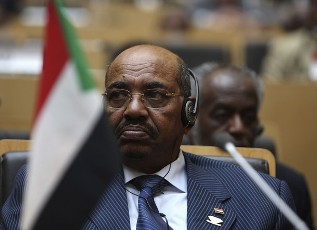Bashir reiterates Sudan’s rejection to “biased” aid groups
February 15, 2012 (KHARTOUM) – The Sudanese President Omer Al-Bashir has vowed that Khartoum will remain defiant in the face of pressures to let international aid groups into the country’s war zones of South Kordofan and Blue Nile, one day after the United Nations Security Council (UNSC) urged access to address a deteriorating humanitarian situation.

The UN says food insecurity and malnutrition have reached “alarming levels” in rebel controlled areas since the conflict started in South Kordofan in June last year and later spread to Blue Nile.
Addressing the opening session of the conference of Al-Dawa Islamic Organization in Khartoum on Wednesday, Bashir launched a fierce attack on international humanitarian organisations, accusing those already operating in the two states of being “biased” and delivering “slanted” aid.
Bashir thanked local and Islamic organisations for what he described as becoming an alternative to international organisations which exploit the needs of displaced people, as he put it.
UN estimates say that the fighting in recent months has forced about 417,000 people to flee their homes, more than 80,000 of them to South Sudan.
The remarks of the Sudanese President come after the UNSC issued a statement on Tuesday expressing alarm over the humanitarian situation in the two states, which could reach “emergency levels if not immediately addressed”.
The 15 members of the council called on the Sudanese authorities and the rebels to allow “international humanitarian personnel to conduct an assessment of the situation and deliver urgently needed assistance”.
The United States government recently suggested that the option of unilateral intervention will be considered if Khartoum continued to resist calls for allowing aid groups to access the two states.
But Bashir stressed that his country has no intention of bowing to the pressure.
“They try to pressure and lead us to change our way, but we will not follow theirs because our trust and belief in God is deep, we reject inferiority and we will remain superior. No matter the challenges, we have no way but to overcome them”, he told the conference’s audience.
Last month Khartoum appeared to be softening its stance on the issue when it announced that international aid agencies would be given access to the two states within conditions including that the delivery of aid be conducted by local organisations.
Sudanese officials accused the west of seeking to “feed” the rebels under the blanket of humanitarian intervention.
Khartoum’s relations with international aid groups have been characterised by suspicion and security concerns.
In March 2008, Sudan expelled 13 international aid groups from the western region of Darfur after the International Criminal Court (ICC) issued a warrant for the arrest of Bashir on charges of war crimes and crimes against humanity allegedly committed during the region’s conflict. At the time Khartoum accused the aid groups of spying for the Hague based court.
(ST)
